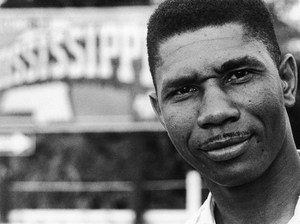Medgar Evers
Medgar Evers’ assassination on 12 June 1963 often overshadows his invaluable role in the Civil Rights Movement. As the field secretary of NAACP, Evers showed determination in the face of intimidation and greatly advanced civil rights in Mississippi.
Born on 2 July 1925, Medgar Evers grew up in Decatur, Mississippi. During the 1920s, life was extremely difficult for African Americans in the South. Jim Crow laws were enforced by the Ku Klux Klan; lynching was a popular form of punishment and segregation existed in all aspects of life.
Like all the black youths in Decatur, Evers was the victim of racial abuse from an early age. He later recollected on the lynching of a family friend. His only ‘crime’ was that he answered back to a white woman. The dead man’s bloodied clothes were left in public as a warning to other African Americans.
Evers overcame these obstacles - including having to walk a total of 24 miles to and from school each day - and graduated from high school. He joined the American Army during World War Two and was honourably discharged in 1946.

His experience in Europe left him with the determination to fight tyranny in the South. Surprisingly, Evers was able to register to vote for the 1948 election. However, despite fulfilling the legal requirements, Evers was prevented from voting by a mob of 200 white men who blocked his way.
Evers and his brother responded by joining the NAACP. Medgar worked with the organisation whilst studying at Alcorn A + M College in Lorman, Mississippi. Evers married Myrlie Beasley while he was at college. He graduated in 1952 with a degree in business administration. He then became an insurance salesman.
Despite Evers comfortable lifestyle, he encountered racial injustice on a daily basis. One day in 1954, he witnessed an attempted lynching whilst he visited his father in hospital. Ever left the subterranean ‘Negro Ward’ of the hospital to get some fresh air. He saw a large mob of white gathering outside the hospital. They demanded that an injured black man be taken from the hospital. The man had been in a fight with a white man in the town of Union and they wanted justice.
Following this incident, Evers left his job and started work with the NAACP full-time, soon becoming field secretary for Mississippi. Evers quickly became popular and moved to Jackson where he would be closer to other civil rights leaders.
However, he received many threats for his work with NAACP. He taught his children to fall to the floor if they heard any strange noises outside. His wife admitted that she always expected Evers to be killed for his work - his house was even firebombed shortly before his death. Evers threw himself into work, focusing on voter registration.
Medgar’s assassination on 12 June 1963 followed J F Kennedy’s promise to push forward civil rights measures. As Evers got out of his car, he was shot in the back and died 50 minutes later in hospital.
A rifle belonging to KKK member, Byron de la Beckwith, was found close to the crime scene and his fingerprints detected in the scope. He was quickly arrested and put on trial. However, an alibi claimed he had been seen 60 miles away at the time of the murder.
De La Beckwith was twice tried for murder in 1964, but both trials ended in mistrials with all-white, all-male juries unable to reach verdicts. A third trial in 1994, before a jury of eight African-Americans and 4 whites, convicted Beckwith of the murder of Evers.
Medgar Evers contributed a great deal to the Civil Rights Movement. He encouraged local citizens to resist all aspects of white supremacy and has been praised for his ability to turn fear into activism.
See also: Martin Luther King
MLA Citation/Reference
"Medgar Evers". HistoryLearning.com. 2026. Web.
Key facts
| Name: | Medgar Evers |
| Birth Date: | 2 July 1925, Decatur, Mississippi |
| Assassinated: | 12 June 1963, |
| Spouse: | Myrlie Evers-William |
| Occupation: | Civil rights activist and field-secratary for NAACP |
